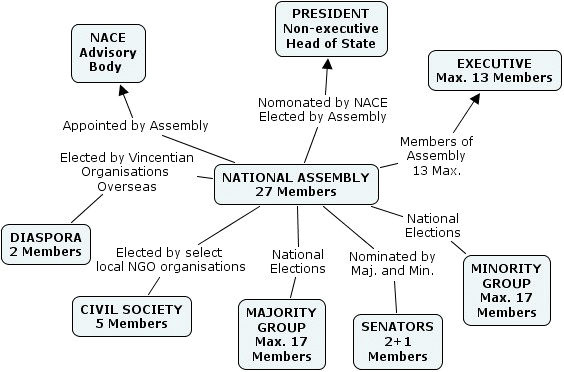CRC'S
PROPOSALS FOR THE STRUCTURE OF GOVERNANCE
THE STRUCTURE

SOME OBSERVATIONS ON THE
PROPOSALS
The National Assembly is at the
centre of the structure which is the same as with the
former House of Assembly. As such the ethos of
Parliamentary Democracy will be maintained. However, it
must be remembered that we are still in the process of
developing a system of Local Government and we will
therefore have to find some accommodation for
representation from this entity.
- The President will have a
non-executive role but there will have to be some
clarification about what this person really does
since some of his/her functions are clearly not
non-ceremonial.
- NACE by its constitution
and functions is an advisory body. However, there
functions are very influential in the governance
of the country and its members have be men and
women with credibility. This is why the idea of
having members by right has to be carefully
examined. Further, the body seems to have the
character of a second chamber in the National
Assembly although there has been insistence on a
unicameral arrangement.
- It is morally sound and practical
to have representation from the Diaspora. However,
the logistics implied by the present arrangement
for their contribution are difficult to say the
least.
- The integration of Civil
Society into the governance system is perhaps
one of the most important constitutional
innovations. The reason for this springs from the
desire to reduce the crass partisanship the
nations suffers from those who govern. This is
why things have to be done to ensure that the
group has to have the respect and credibility
when they get into the House of Assembly. The
question therefore is whether the relevant
proposal need to ensure their legitimacy. If the
nation is not satisfied in this regard the
proposals will be rejected. For example, the idea
of Civil Society representatives become Ministers
is really counteractive to the purpose of having
them in Government.
- Given the role of Civil Society in
reducing the partisanship in the National
Assembly, it is difficult to see why the Majority
and Minority groups should nominate Senators
for the National Assembly. These Senators will
surely strengthen the partisan role of the the
traditional representative in the Assembly.
These proposals will be discussed in
another forum but readers should pay more attention to
these immediately. It is really not a good thing to wait
until the referendum.
HOME
|